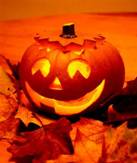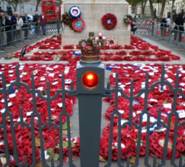


Important Upcoming Dates and Events in the British Calender |
There are many dates in the British calendar that are widely celebrated or commemorated; here are just a few examples of these that have come up recently or are still to come:
Halloween- 31 st October
Bonfire Night/Guy Fawke's Night- 5th November “Remember, remember, On this day people celebrate by going to or doing their own firework displays and making bonfires. On the bonfires a straw dummy of Guy Fawkes is burnt in celebration.
Remembrance Day/Armistice Day - 11 th November This is the day that on the eleventh hour of the eleventh day in the eleventh month in 1918 the First World War was ended. On this day every year we remember all the men and women who were killed over the two world wars and also other wars. Red poppies are sold by the Salvation Army for people to wear to show respect. The money goes towards charities to help families and soldiers affected by war. Special services are held all across Britain on Sunday closest to 11 th November, they are held at churches and war memorials. Wreaths are laid down by companies and societies etc and individuals put a wooden cross in memorials to remember a family member who may have died in the war. There is a two minute silence at 11 o'clock on this day and the “Last Post” ( a melody played by a single bugle to mark the end of the day and farewell) is played to start it. A poem called “For the Fallen” is read at services, here is a famous verse from it: “They shall not grow old, as we that are left grow old:
Christmas Day is when we celebrate the birth of Christ. On the lead up to this day, people decorate their houses and put up Christmas trees, send Christmas cards and enjoy the jolly season with carol services and nativity plays etc. On Christmas Day, families get together to celebrate, exchange gifts and have a big roast lunch. After Christmas day, Boxing Day follows the next day which is also a public holiday. Christmas Eve is the day before Christmas Day and that is when Father Christmas is supposed to deliver all the presents to the children in the night if they have been good that year. Traditionally Father Christmas would enter the house down the chimney and put the presents in a stocking at the end of their beds. Children leave a glass of milk and a carrot for Father Christmas and the reindeer (the animals that transport him) to help them on their way!
New Year's Day is the first day of the year and the time to look forward to the coming year. People make New Year resolutions of things they hope to achieve that year, for example quit smoking. This day is a bank holiday and it is traditional to welcome the New Year in the night before, (New Year's Eve). On this night in Britain there are parties, fireworks, and everyone counts down from 10 to the second it becomes midnight. As Big Ben strikes midnight, it is traditional to link arms and sing Auld Lang Syne. In London fireworks are fired from the London Eye where many gather to watch.
St. Valentine's Day- 14 th February On this day it is traditional for people to express their love for another by sending a Valentine's card, flowers or chocolates. The gifts are sent anonymously, with a "?" left instead of a name in the card. However, not everyone decides to do this.
Shrove Tuesday- 16th February (in 2010) Shrove Tuesday is also called Pancake Day and is celebrated the day before Ash Wednesday and the Tuesday before Lent. It has religious origins of when Christians used up all the rich foods in the cupboard before Lent. This was because during Lent, eggs, sugar and butter were not allowed so they were used to make pancakes. Even though it has a religious background everyone celebrates and makes pancakes regardless. An English pancake is very thin and traditionally with caster sugar and lemon sprinkled on the top.
|





